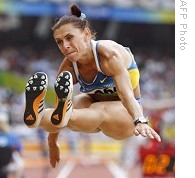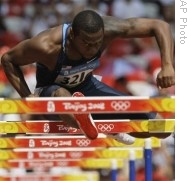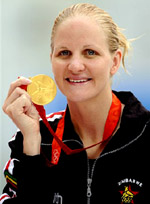VOA标准英语2008年-US Athletes Drug-Free at Beijing Games(在线收听)
 |
| Lyudmila Blonska competes during long jump event at Beijing Olympics |
Heptathlon silver medalist Lyudmila Blonska of Ukraine is the latest Olympic athlete to test positive. As a result, she has been stripped of a silver medal in women's heptathlon.
Previously disqualified in Beijing were Greek hurdler Fani Halkia, North Korean shooter Kim Jong Su, Spanish cyclist Isabel Moreno and Vietnamese gymnast Thi Ngan Thuong Do. Kim was stripped of silver and bronze medals.
None of the athletes caught cheating were Americans, a fact that U.S. Olympic Committee (USOC) Chief Executive Officer Jim Scherr applauded Friday.
"This team has been clean and drug free to this point in the games, he said. "We anticipate that will continue throughout. We could not be more proud of how this team has behaved and brought honor to the United States and exhibited the best of the Olympic ideals here in Beijing, both on the field and off."
U.S. fencing silver medalist Erin Smart says much of the credit goes to testing.
"We have the U.S. Anti-Doping Agency (USADA) who follows up with all the athletes and really tracks and monitors what we do in terms of our whereabouts and the testing," she said. "When we set foot on the stage, we know that we are clean athletes. We are proud to wear our medals knowing that we are drug free."
 |
| David Oliver clears a hurdle in a men's 110-meter hurdles first round heat in Beijing, 18 Aug 2008 |
David Oliver, the American bronze medalist the men's 110-meter hurdles, says being drug free reduces competitive pressures.
"Everything that the U.S. team has accomplished here is all being positive," he said. "We do not have to be overshadowed by and drug scandals or anything like that. You have to take you hat off to the USOC and USADA for their efforts."
The International Olympic Committee has conducted about 4,500 drug tests during the 16-day games in China. That is a 25-percent increase from the Athens Olympics four years ago, when 26 athletes tested positive.
 |
| Kirsty Coventry with first gold medal from Beijing Olympics, 16 Aug 2008 |
Swimmer Kirsty Coventry of Zimbabwe won the women's 200-meter backstroke in Beijing. She tries to keep a positive outlook when it comes to doping.
"I want to full heartedly believe that all athletes are clean," said Coventry. "And especially the top athletes. And that they are doing it through their love of the sport and love of being a competitor and being able to race. I hope no one associates that with me. I pride myself on being a clean athlete. And I think my multiple tests that I have had during the week can prove that."
Women's 200-meter sprint champion Veronica Campbell-Brown of Jamaica competes in a sport that has had a turbulent past.
"The sport is tainted. But people can think what they want to think," she said. "I know in my heart that I am very talented. I train extremely hard. I do not do doping. Because all the things that our fellow athletes have done before us, I do not blame society to think that anybody out there running fast is on dope. But all the drug testing bodies can do is just to do rigorous tests. Then they can kick the cheaters [out]."
So far, a total of 86 Olympic doping cases have emerged since the IOC introduced drug tests at the 1968 Mexico Olympics. The IOC hopes that the limited number of cases in Beijing is the start of a positive trend.